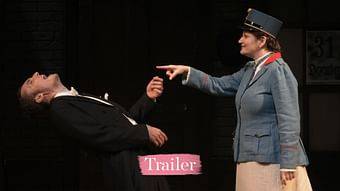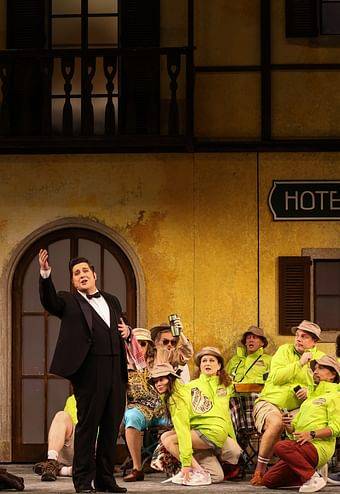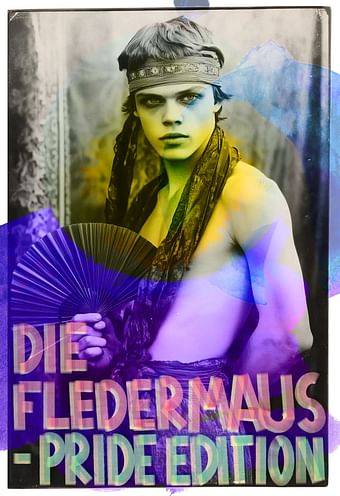It is probably the most popular, but certainly the most Viennese of all operettas: Johann Strauss' immortal Fledermaus. Parties that get out of hand, erotic mix-ups, conspiracies, intrigues and a large portion of schadenfreude: the climax of the classical Viennese operetta era offers ambiguous entertainment in waltz rhythm. And if the social façade crumbles too much, you can still blame everything on the effect of champagne.
The Volksoper is considered the most Viennese opera house in the city. So it is not surprising that Johann Strauss' masterpiece is practically family silver here. No work has ever been performed more often at the Volksoper. At the beginning of Lotte de Beer's directorship, the performance was carefully refreshed, and a female "Frosch" has since provided a fresh look at a well-known piece.
Act 1
Adele, the chambermaid at the Eisenstein house, receives an invitation to a soiree to be held at Prince Orlofsky’s. In order to get the evening off, she presents her mistress Rosalinde a moving tale about a sick aunt. However, Rosalinde refuses to let Adele have time off, because today her husband Gabriel is to start his five-day prison sentence for assaulting an official.
The tenor Alfred, and admirer of Rosalinde, can hardly wait for Eisenstein’s spell in prison to begin so that he can visit the lady of the house undisturbed. He obtains permission to come again as soon as Eisenstein is in prison.
No sooner has he gone off again when Eisenstein arrives home, accompanied by his lawyer Dr. Blind, and furious because his punishment has been increased to eight days. He throws Dr. Blind out, sends Adele to fetch him an opulent “condemned man’s supper” and asks Rosalinde to bring him his shabbiest suit. Dr. Falke appears and persuades Eisenstein to come with him to the party at the Orlofsky palace before he starts his punishment. Rosalinde is surprised at her husband’s sudden change of mood, as he now wishes to go to prison in elegant evening dress. In good spirits, Eisenstein leaves the house after a moving farewell scene. Rosalinde now gives Adele the evening off after all.
No sooner is she alone when Alfred appears. He makes himself at home in the dressing gown that belongs to the master of the house and sits down to supper. The prison director Frank bursts in to fetch Eisenstein away. Rosalinde has no choice but to present Alfred as her husband. In order not to compromise her, Alfred plays along with this, and allows himself to be seized by Frank, without missing the opportunity of taking a tender farewell from Rosalinde.
Act 2
At Prince Orlofsky’s palace. Ida is surprised to meet her sister Adele at the ball, but decides without further ado to introduce her to society as the aspiring artist “Olga“. Dr. Falke promises his worth millions, yet gloomy host that he will have something to laugh about today: He has set up a little comedy. When Eisenstein enters, Falke introduces him as “Marquis Renard”. He recognises Adele instantly, but when he says she looks like a chambermaid Adele uses the situation skilfully in order to put him to shame. Prison director Frank has also appeared under the name of “Chévalier Chagrin”, and he makes friends with Eisenstein, who is not personally known to him. Finally, Rosalinde also appears, following an anonymous invitation, disguised in a mask as a Hungarian countess.
Eisenstein is immediately entranced by the beautiful unknown woman, and flirts intensively with her. She manages to get hold of his watch as a piece of evidence for his infidelity. After Rosalinde has brilliantly proved her incognito in front of the entire festive company, Orlofsky asks again for the promised fun. So, Eisenstein resorts to an anecdote from his young bachelor days: After a masked ball, Eisenstein deposited the drunken Falke in the marketplace wearing nothing but a bat costume, and left him to walk home to the mocking shouts of the market folk. Orlofsky is amused and amazed in equal measure: Dr. Falke has not yet taken revenge for the embarrassment?
The party continues with dancing and drinking, kissing and swearing brotherly love, until six in the morning. Then all say the party must end, Frank must go to work at the prison, and Eisenstein must start his spell in prison.
Act 3
Prison, early morning. Bailiff Frosch has her troubles with the tenor in cell no. 12 and with the turmoil of justice. In a very cheerful state Director Frank enters his office, where he is greeted by the prison supervisor. Frank immediately goes to sleep in an armchair, but is soon wakened by Adele and Ida, who have come to ask the “Chévalier Chagrin” to finance Adele’s training as an actress. When Eisenstein is announced, Frosch quickly locks both girls in a cell.
Frank and Eisenstein explain their true identity to each other. But Frank does not believe his friend, since he himself had the previous day personally arrested Eisenstein in his house! The lawyer Blind appears, in order to intervene on the part of the (false) Eisenstein. The real Eisenstein takes away Blind’s hat and the tools of his trade and slips into his role in order to find out the truth.
Rosalinde and Alfred complain about the faithless Gabriel, who has spent the night in the company of pretty women. Rosalinde wants to divorce him. Raging with anger and jealousy, Eisenstein reveals his identity and is about to create a scene, when Rosalinde holds his watch out to him. All parties now enter the prison, Falke explains that he has set up the whole thing in order to have his revenge for the “bat” episode. Eisenstein has no choice but to beg Rosalinde’s forgiveness and start his prison sentence. Prince Orlofsky is willing to support Adele’s acting career, and all ends happily: It is the champagne that is to blame!
Cast
- Revived production
- Carsten Süss
- Set design
- Pantelis Dessyllas
- Costume design
- Doris Engl
- Original design by
- Evelyn Frank
- Choreography
- Lili Clemente
- Choreography
- Susanne Kirnbauer
- Musical direction
- Alexander Joel
- Gabriel von Eisenstein
- Carsten Süss
- Rosalinde, seine Frau
- Ursula Pfitzner
- Adele, deren Stubenmädchen
- Hedwig Ritter
- Ida, ihre Schwester
- Julia Edtmeier
- Dr. Falke, Notar
- Daniel Schmutzhard
- Prinz Orlofsky
- Annelie Sophie Müller
- Alfred, Gesangslehrer
- David Kerber
- Frank, Gefängnisdirektor
- Marco Di Sapia
- Frosch, Gerichtsdienerin
- Sigrid Hauser
- Dr. Blind, Advokat
- Karl-Michael Ebner
Photos and Videos
For all those who use a screen reader, a description of the visual aspects of the performance (set design, costumes...) follows here instead of the photo gallery.
The operetta takes place in a historical stage set, which is set roughly at the time of the play's creation at the end of the 19th century. In the first act, the home of the Eisenstein family, a classic Viennese living room, furnished in great detail with furniture and textiles. In the second act: Prince Orlofsky's rooms, where an opulent party is celebrated. In these ball scenes, all the actresses wear historical ball gowns, while the men mostly wear tails and top hats. There is partying, dancing and drinking. The third act takes place in a prison, with an entrance to the cells on the left and a desk in the middle. Here, too, the characters wear historical costumes. The stage sets are all richly detailed and equipped with numerous props and pieces of furniture, creating realistic-looking spaces.

_mit_Ursula_Pfitzner_(Rosalinde).jpg)
.jpg)
_mit_Carsten_Suess_(Gabriel_von_Eisen.jpg)
_mit_Daniel_Schmutzhard_(Falke).jpg)
.jpg)
.jpg)
.jpg)
.jpg)
.jpg)
-2.jpg)
.jpg)
.jpg)
.jpg)
q.jpg)
.jpg)
.jpg)
.jpg)
.jpg)
.jpg)
.jpg)
.jpg)
.jpg)
.jpg)
.jpg)
.jpg)
.jpg)
.jpg)
.jpg)
.jpg)
.jpg)
.jpg)
.jpg)
.jpg)
.jpg)
.jpg)
.jpg)

